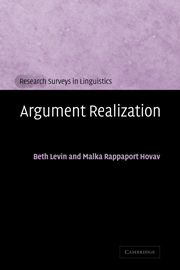Book contents
- Frontmatter
- Contents
- Acknowledgments
- Introduction
- 1 Challenges for theories of argument realization
- 2 Semantic role lists
- 3 Current approaches to lexical semantic representation
- 4 Three conceptualizations of events
- 5 The mapping from lexical semantics to syntax
- 6 Thematic hierarchies in argument realization
- 7 Multiple argument realization
- 8 Postscript
- References
- Index of topics
- Index of authors
- Index of languages
6 - Thematic hierarchies in argument realization
Published online by Cambridge University Press: 28 October 2009
- Frontmatter
- Contents
- Acknowledgments
- Introduction
- 1 Challenges for theories of argument realization
- 2 Semantic role lists
- 3 Current approaches to lexical semantic representation
- 4 Three conceptualizations of events
- 5 The mapping from lexical semantics to syntax
- 6 Thematic hierarchies in argument realization
- 7 Multiple argument realization
- 8 Postscript
- References
- Index of topics
- Index of authors
- Index of languages
Summary
The discussion of the semantic determinants of argument realization in previous chapters centered on individual arguments of a verb, but interactions between arguments that affect argument realization cannot be ignored. These interactions suggest that there are precedence – or prominence – relations among arguments statable in terms of their semantic roles. This chapter examines the possible sources of these relations through an in-depth examination of the construct known as the thematic hierarchy – a ranking of semantic roles chosen because it figures in the statement of linguistic generalizations. Although this construct has been widely implicated in linguistic phenomena, particularly those involving argument realization, many conflicting formulations have emerged, leading some researchers to voice skepticism concerning its validity. It is for this reason that we devote an entire chapter to the thematic hierarchy. Three major questions are the focus of this chapter: which notion of prominence underlies the ranking that defines a particular formulation of the thematic hierarchy, which linguistic phenomena is it supposed to account for, and can its effects be derived from more basic components of a lexical semantic representation?
We show that two major conceptions of prominence find their way into analyses of linguistic phenomena that appeal to a thematic hierarchy. On the first, the ranking of semantic roles is determined by structural properties of a lexical semantic representation – properties defined over a predicate decomposition or event structure. On the second, the ranking is determined by entailments associated with arguments. Our examination of these two conceptualizations supports the conclusions of earlier chapters that the mapping from lexical semantics to syntax needs to make reference to arguments in both ways.
- Type
- Chapter
- Information
- Argument Realization , pp. 154 - 185Publisher: Cambridge University PressPrint publication year: 2005
- 1
- Cited by



